L.M. Nelson's Blog, page 25
November 21, 2017
5 Ways to Find “The Zone” When Writing.
Here’s a great article on how to get in the writing zone.
Do you know that feeling when everything clicks? When the words flow like endless pools of serene water? When you stop thinking about writing and just…write?
It feels good, doesn’t it? And lord knows when you read it back you think, “Damn, I’m good, like I’m really good. Jesus, this is the best thing I have ever read.” Then you stop for a second and wrinkle your brow. “Wait, did I write this?”
I know what you’re thinking, “Is there a magical pill for this?” A drug you would kindly pay for? Probably, but I’m pretty sure it’s illegal to mention drugs online so I can’t back anything publicly.
Do not fret my fellow Lions and Lionettes, for I have discovered the secrets to unlimited access to, “the zone!” Or not, maybe I’m just a crazy lion waiting for Mufasa to come back……NYLAAHH!
Disclaimer: There may or may not be…
View original post 788 more words


Worthwhile Writer’s Resources
There are a ton of writing resources out there. Some offer flim-flam, others offer sound advice. I’m going to direct you to some of the better resources I’ve encountered out there, in no particular order.
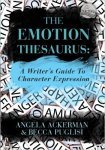



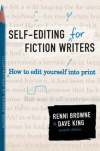
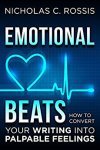

[image error]
By far, one of my favorite books on the writing craft is On Writing by Stephen King.
On Writing is both a textbook for writers and a memoir of Stephen’s life. If you’ve always wondered what led Stephen to become a writer and how he came to be the success he is today, this will answer those questions.
[image error]
I recently purchased The Emotion Thesaurus: A Writer’s Guide to Character Expression, and it has been a godsend.
It has 75 emotion entries that list body language, thoughts, and visceral responses. It offers suggestions for each emotion ranging from mild intensity to severe. It’s easy to navigate through and helpful during the revising and editing process. Highly recommended.
[image error]
Bryn Donovan has a fabulous blog with an entire section on Writing Resources. Look on the sidebar on the left for Top Posts & Pages. She had a series of MASTER LIST posts that are extremely helpful for any writer. Her MASTER LIST series has also been compiled into a book. Definitely worth looking into.
[image error]
Nicholas Rossis’ Emotional Beats is similar to Bryn’s Master Lists and The Emotion Thesaurus. He adds a few more elements to his book, specifically focusing on beats. This book includes hundreds of examples to show anger, fear, indifference, and the whole range of emotions that characterize the human experience.
[image error]
The Kick-Ass Writer was not only informative, but highly entertaining to read. In this book, Chuck Wendig explains how to build suspense, craft characters, and defeat writer’s block. He explains how to write a scene, an ending, and even a sentence. He offers blogging techniques, social media skills, and crowdfunding ideas. Whether you’re just starting out or need a push to get over the top, Wendig offers advice that will destroy your fears, clear the path, and help you find your voice, your story, and your audience.
[image error]
In Bird By Bird, Anne Lamont teaches us as much about writing as she does about creativity at large.
“Writing has so much to give, so much to teach, so many surprises. That thing you had to force yourself to do — the actual act of writing — turns out to be the best part. It’s like discovering that while you thought you needed the tea ceremony for the caffeine, what you really needed was the tea ceremony. The act of writing turns out to be its own reward.”
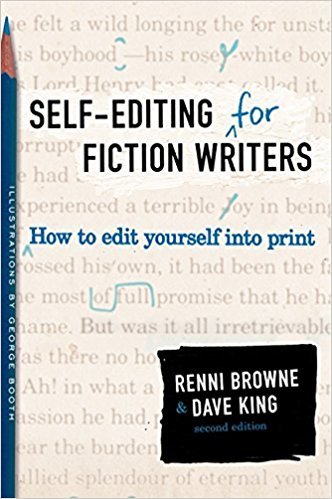
Self Editing For Fiction Writers includes chapters on dialogue, exposition, point of view, interior monologue, and other techniques that take you through the same processes an expert editor goes through to perfect a manuscript. It’s full of all kinds of information that will make your writing better.
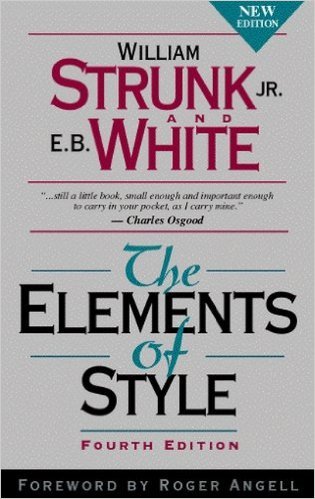 If you’re like me and you write a lot, there is always going to come a time when you need to look up something about correct grammar usage.
The Elements of Style
has all the answers to those pesky grammar questions. A few of the addressed topics are how to use parentheses, possessive nouns, commas, colons, cases, hyphens, and participles. Strunk and White offer sound advice on voice, tense, tone, paragraphs, and connecting ideas. There are a bunch of homonyms, idioms, and homophones that give people trouble in writing. This little book gives you the proper usage and a few tricks to remember their use.
If you’re like me and you write a lot, there is always going to come a time when you need to look up something about correct grammar usage.
The Elements of Style
has all the answers to those pesky grammar questions. A few of the addressed topics are how to use parentheses, possessive nouns, commas, colons, cases, hyphens, and participles. Strunk and White offer sound advice on voice, tense, tone, paragraphs, and connecting ideas. There are a bunch of homonyms, idioms, and homophones that give people trouble in writing. This little book gives you the proper usage and a few tricks to remember their use.There are great writing resources out there, and I’ve read quite a few. Some I keep right by my side to refer to when I write. Whether you find any of these resources useful or not, each of us have areas where we can grow as writers, and these, as well as other resources, are available to help us improve our craft.
Happy writing.


November 18, 2017
New Book Cover
November 12, 2017
Reader’s Choice Awards
[image error]I’m so excited because my book, Center Stage, was just nominated for the 2017 Readers Choice Awards! Please vote for it at www.tckpublishing.com/readers-choice-voting. Look for it under General Fiction. Thank you all for your continued support.


November 7, 2017
How Not to Get Overwhelmed with Indie Publishing
Feeling overwhelmed by the whole indie publishing process? Fear not. Here’s some great advice from a wonderful person who has taught me a lot about the industry. Take it away, Rachael!
via How to Not Get Overwhelmed with Indie Publishing


November 5, 2017
Writing a Stellar Book Blurb
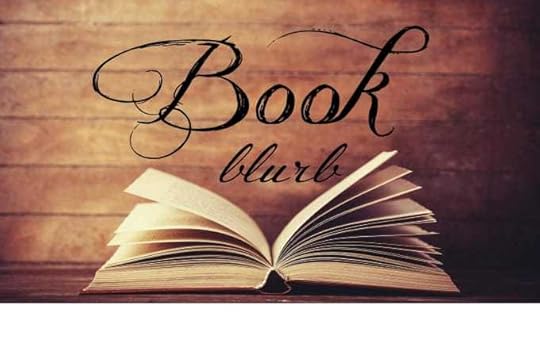
I don’t know about you, but writing the novel is the easy part, compared to writing the book blurb. How do you take a 100+ page novel and condense it to fit on the back cover of a book? And how do you make it intriguing enough to get people to want to read it? Writing a book blurb has always been challenging for me, but I recently took several classes on this topic and learned a few things that you might find helpful.
The blurb on the back of your book is all about the journey. Who is your protagonist? What is his or her goal? What problems are they up against? Readers want to discover this journey on their own. Give them a glimpse inside your book that draws them into the character’s world.
There are three main elements to a good book blurb.
The setup. This is the underlying theme of the book, the problem. For example, “She was kidnapped not once, but twice, and now someone wants her dead.”
The capture. This is the backstory, the kickstart, the conflict. The capture tells the reader about the hurdles the character has to get over to meet their goal.
The intrigue. Leave the reader with a question. Will the character succeed or fail?
When writing a book blurb, always remember to include the name of the protagonist, 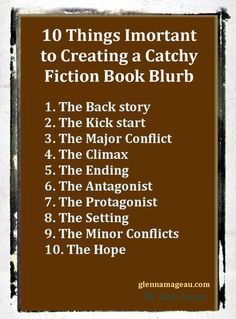 what the protagonist wants, and how the protagonist got in this situation. What is the connection between the protagonist and the antagonist? What are the main events that kickstart the story? What is the first main event that stops the protagonist from moving forward? Also, make sure the tone of the blurb matches the tone of the book. If the book is dark, emotional, mysterious, then the blurb needs to be too.
what the protagonist wants, and how the protagonist got in this situation. What is the connection between the protagonist and the antagonist? What are the main events that kickstart the story? What is the first main event that stops the protagonist from moving forward? Also, make sure the tone of the blurb matches the tone of the book. If the book is dark, emotional, mysterious, then the blurb needs to be too.
Be careful though, because a book blurb is not a synopsis or a summary of your book. Blurbs should be around 200 words and should focus on the struggle. A blurb is not a detailed description. A book blurb is also not an endorsement. Testimonials should not be included in your blurb. If you want to include them before or after the blurb, that’s fine, but they should not be present in the blurb itself.
For more information on this topic, visit the following sites:
How to Write Back Blurb for Your Book
How to Write an Effective Book Blurb
How to Write a Fiction Book Blurb
A Simple Outline for Writing a Killer Book Blurb
7 Tips For Writing a Book Blurb
How to Write a Great Book Blurb
What’s the Difference Between a Book Blurb and a Synopsis?
How to Write a Killer Book Blurb
Ten Question Cheat Sheet for Writing a Compelling Book Blurb


A Few Craftperson’s Tools
As writers, our initial task is to get something down on paper, uncensored. If we want to make a piece “public”, or refine it for our own satisfaction, then the process of crafting begins. I often think of crafting as sculptors have described: setting the sculpture free from the marble. So it is with writing. […]
via A Few Craftsperson’s Tools — Wake Up Princess


October 7, 2017
Boerne Book Festival
I will be at the Boerne Book and Arts Festival on Saturday, October 14. If you’re in the area, stop on by for a celebration of the arts.


September 2, 2017
An Author’s Secret Weapon: Marketing Advice for Twitter
Here’s some more marketing information you might find helpful.
 Today I have another guest post for you, by another one of my friends, N.N. Light. She is the author of the fantasy book “Princess of the Light.”
Today I have another guest post for you, by another one of my friends, N.N. Light. She is the author of the fantasy book “Princess of the Light.”
She’s not here to speak of her book though. Instead, she has some great tips to share about book marketing, and specifically how to best use Twitter to promote your book.
Aaaand, take it, dear Ms. Light!
Marketing Advice for Twitter
“What is the secret to marketing my book?”
I see this question a lot on Twitter and various blogs I subscribe to. In this age of self-publishing, the world is filled with authors trying to sell their books. Everyone wants to know the secret and to increase their sales. I also am asked this question and as I am just starting out in this great big world of book marketing, I have to rely on my experience as a professional…
View original post 757 more words


10 Essential Skills for Every Writer
Great article with some sound advice.
This is a guest post by Lucy Benton. Lucy is a writing coach and editor who finds her passion in expressing own thoughts as a blogger, and currently works at Assignment Helper . She is constantly looking for the ways to improve her skills and expertise. If you’re interested in working with Lucy, you can find her on FaceBook and Twitter .
10 Essential Skills for Every Writer
The way you write says a lot about your development as an author. Any person who says that anyone can write a good story does not understand the process of writing as well as its essentials. Of course, many people have great ideas for writing but they cannot produce high-quality work because they lack essential writing skills.
Okay, you may think I’m throwing you for a loop here. However, listen to this: writing is so much more than creating. Experienced authors use a…
View original post 225 more words










